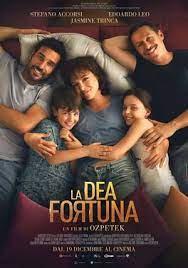
GODDESS OF FORTUNE/ DEA DI FORTUNA
Italy, 2019, 119 minutes, Colour.
Stefano Accorsi, Eduardo Leo, Jasmine Trinca, Sara Ciocca, Eduardo Brandi, Barbara Alberti, Dora Romano.
Directed by Ferzan Ozpetek.
Ferzan Ozpetek, originally from Turkey, living in Italy, has been making striking human drama since the end of the 1990s. Here he is with his themes, 20 years later.
Ozpetek is a gay man, a gay director, sexual orientation being significant in most of his films. Here is a variation, and established relationship, over many years, over many years, ups and downs, ambitions frustrated, infidelities. The couple is played by veteran actors, Stefano Accorsi and Eduardo Leo.
The title is taken from a statue of the goddess of Fortune in a monument in the town of Palestrina where the woman at the centre of the film works and which has an influence on her children.
At the core of the film is the relationship, from the past, with a woman who has rebelled against her harshly strict mother, left home, has entered into relationships, has a daughter, forward and outspoken, and the younger son, rather more prim, father uncertain. She is played by veteran actress, Jasmine Trinka.
On the one hand, the issue is of the woman and her being ill, diagnosis and prognosis, hospitalisation. On the other hand, there is the issue of who will care for her children while she is in hospital, her wanting to entrust them to the men. This raises the issue of gay couple, parenting, responsibilities, capacities, society’s attitudes. However, they are surrounded by an eccentric group of friends who are very supportive.
With the serious illness, a decision is made that the children should go back to stay with her grandmother, the men travelling to take her, encountering the harshness of the old woman, but also meeting her companion/servant. They leave the children.
The story becomes more serious when the woman dies, the men coming for the funeral, discovering that the old woman is treating her granddaughter as harshly as she did her daughter, a dilemma for them because they are in personal conflict, the discovery of an affair, one of the men frustrated in his ambitions in academia, forced to do translations, the other a labourer, discovering that his partner had been cheating and wanting to leave.
The drama comes to a head, the men fortunately being helped by the sympathetic companion, taking the children – and facing the prospect of a middle-aged gay couple taking on the role of parenting.
- Family drama, mother and children, gay couple and fathering?
- The settings, the Italian city, homes, building worksites, the streets, markets, hospitals, the boat journey, the country mansion and interiors? The musical score?
- The opening, the atmosphere, the party, straight, gay, transgender? Setting the tone?
- The story of Arturo and Alessandro, their age, 15 years together, memories of their first meeting, friendship with Anna Maria, homosexuality, partners, settling, home and companionship? Arturo and his story, his later recounting what he gave up, University professorship, his writing, work on translations, keeping house? The contrast with Alessandro, the plumber, practical, out on the job? The ordinariness of the relationship, the loss of passion, the revelation Arturo and his affair with the artist, his physical collapse, calling Alessandro, the truth, taking him home, a two row and his plan to leave?
- Into this setting, Anna Maria, the story of her past, her harsh mother, escaping, men and partners, her two children, her health, coming to her friends for help, in hospital, the doctors, tests, the brain, the need for surgery? The visits of the two men to the hospital?
- The children, entrusted to the two men, their range of friends, characters, the couple, the old lady…? And trusting the children to their care for an hour? Alessandro taking the boy to the house for the plumbing job, saying that he was apprentice? Martina, interactions between the two, friends, fights, Alessandro and his formal manner, polite, Martina more forthright? With the men, the meals, telling stories, sleeping arrangements? The men responding to the demands of care? The children and their concern about their mother?
- The background of the difficulties, the two men and their clashes, fighting, arguments? Future arrangements? Alessandro and his disappointment about the affair?
- Anna Maria, writing the document about the men to look after the children? Her leaving hospital, dressing up, urging them to take the children to her mother?
- The voyage, the mother, wealthy, harsh, taking the children, her reliance on Leah?
- Anna Maria, her death, the grief, the voyage back to the country mansion, the grandmother and her looking after the children, her reaction to the men, harsh denunciations of them, condemnation of her daughter? To keep the children, demanding that the men leave?
- The importance of Leah, her devotion to the grandmother, the years? Yet the criticism? Helping the men, getting the children to escape, going back to Rome?
- The effect on the men, the death of Anna Maria, the memories, possibilities for forgiveness, love continuing, the bonding, and the children keeping them together?